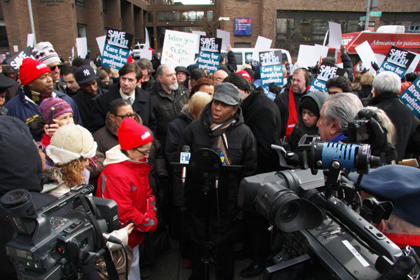THURSDAY IS DOOMSDAY: Critics mobilize on eve of LICH death vote

Saying there has been no financial transparency in the rush to close a vital Brooklyn resource, Downtown Brooklyn political leaders and staff of Long Island College Hospital are calling for a postponement of a vote scheduled for Thursday that is expected to doom the financially troubled hospital.
LICH supporters said they would hold a rally before SUNY’s board of trustees meets at 3 pm at the SUNY School of Optometry, 33 W. 42nd St. in Manhattan. The action begins at 1 p.m. when SUNY’s Academic Medical Centers/Hospital Committee, meeting behind closed doors, hears SUNY Downstate Medical Center President Dr. John Williams’ recommendation that LICH be closed.
SUNY trustees will hold an open meeting between 3 and 5 p.m. during which members of the public, who sign up before 2:30 p.m., will be allowed to speak. Afterwards, the SUNY board’s executive committee, meeting in private, is expected to vote to close LICH.